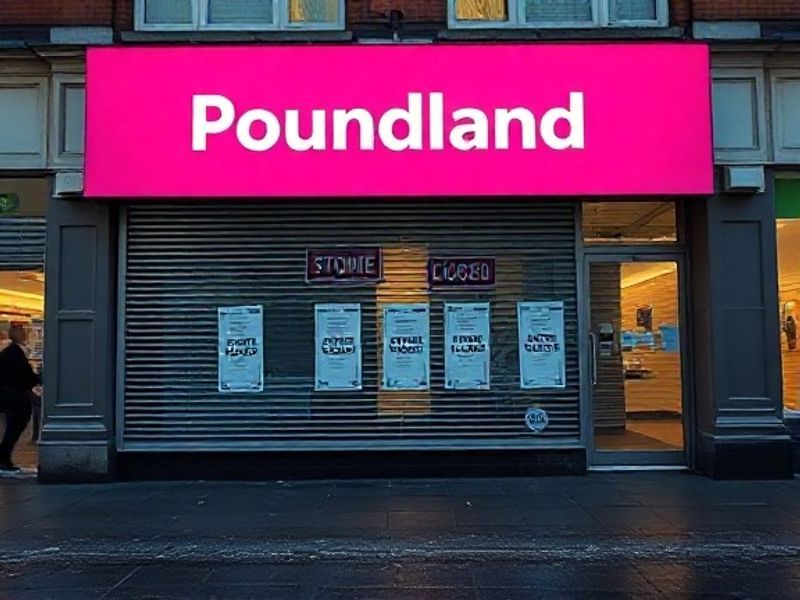Poundland’s Last Stand: How a £1 Shop Became a Global Parable
The Cheap Thrill Is Gone: How Poundland’s Slow Death Mirrors the Collapse of the Post-War Bargain
Across the British high street, the fluorescent lights of Poundland are flickering out like cheap candles at a state funeral. Another 150 stores—roughly one in six—will shutter by Christmas, joining the 800 already boarded up since 2018. If you squint through the drizzle, you can almost see the ghost of globalisation itself packing away the last £1 multipack of custard creams and wondering whether it left its dignity in aisle three next to the off-brand batteries.
Poundland’s parent, Pepco Group, blames “the new normal”: inflation, supply-chain tantrums, consumers suddenly discovering they need food more than novelty screwdriver sets. Translated from corporate-ese, that means the global poor can no longer afford to be cheap. It’s a plot twist worthy of Kafka—if Kafka had ever tried to furnish a student flat entirely with items whose price tag is literally the company name.
Internationally, the chain’s retreat is less a local hiccup than a seismograph tremor. Poundland’s DNA is pure post-1989: Eastern European factories pumping out plastic miracles at slave-wage cost, container ships the size of small principalities steaming through Suez, a single British pound buying the labour of half a continent. When that system works, you get a shop where everything costs less than the coffee you’re holding. When it breaks—as it did in 2021 when the Ever Given blocked the canal, and again when a land war broke out on the factory floor—you discover your £1 price tag is actually a geopolitical IOU.
The wider symbolism is hard to miss. Poundland’s descent coincides with the slow-motion demolition of the global middle-class illusion: the belief that cheap stuff, cheap credit and cheap flights could stretch indefinitely across an overheating planet. In the United States, Dollar Tree is hiking prices to $1.25—an admission that even the almighty dollar has caught inflation like a seasonal flu. In Germany, the €1 shop has become the €1.50 shop and is eyeing €2 like a guilty pleasure. From Warsaw to Wichita, the bargain basement is being evicted by reality.
Meanwhile, the human fallout is quietly Dickensian. Poundland’s workforce skews heavily toward women over 40 and recent immigrants—precisely the demographics least able to absorb a redundancy notice printed on recycled paper. The company’s preferred euphemism is “streamlining,” which in plain English means turning people into statistics before the algorithms do. One former supervisor in Leeds told me she was offered “career transition coaching” that consisted of a laminated sheet on how to download LinkedIn. She framed it; it’s now the most expensive thing she owns.
The environmental angle is equally grim. Every shuttered store leaves behind a small landfill of unsold detritus: solar-powered torches that never saw sunshine, selfie sticks already obsolete, enough plastic grass to re-turf the Serengeti. Some of it will be shipped to West Africa, where it will be burned in open pits, producing the acrid smoke that seasoned journalists recognise as the smell of late capitalism eating its own packaging.
And yet, in the smoking rubble of the £1 empire, there is a perverse sort of hope. If the age of ultra-cheap, ultra-disposable living is ending, perhaps the next era will rediscover concepts like durability, repairability, paying the person who made your socks enough to buy socks themselves. Or perhaps we’ll just invent an app that gamifies dumpster-diving and call it innovation.
For now, the remaining Poundlands soldier on, fluorescent monuments to a bargain that turned out to be a Faustian one. Wander in before the final sale and you’ll see humanity in its rawest form: pensioners clutching multipacks of mystery meat, teenagers filming each other with £1 selfie lights, the occasional suited executive trying to look inconspicuous while buying 30 umbrellas for an office golf day. It’s capitalism’s remainder bin, and everything—absolutely everything—must go.







